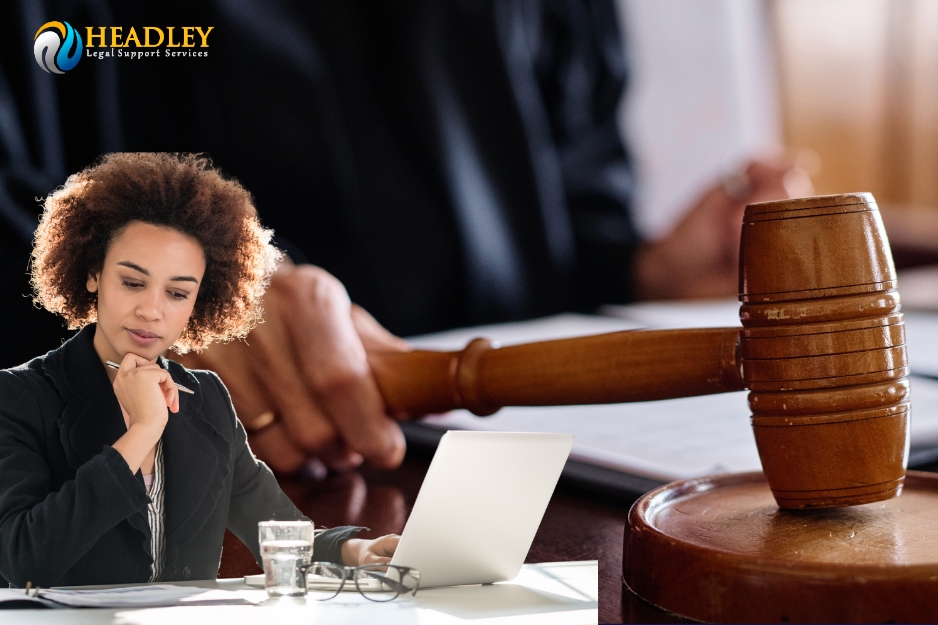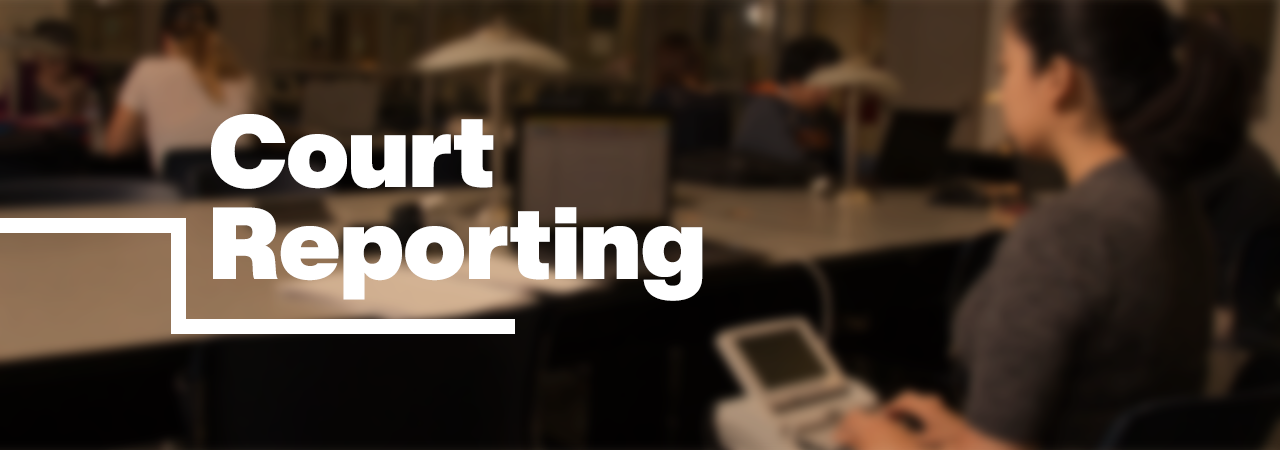Recognizing Court Reporting: A Review of Its Duty in the Lawful Process
Court reporting is an essential component of the lawful system. It assures that every spoken word during depositions and tests is properly recorded. This transcription supplies a trusted document for future recommendation. Court reporters possess specialized abilities and have to browse different modern technologies. durham court reporting. As the legal landscape develops, so also does the duty of these professionals. Comprehending their impact raises vital concerns about the future of lawful paperwork and accountability
The Relevance of Accurate Transcription in Legal Process

Precise transcription plays a vital duty in legal process, functioning as the foundation for justice and liability. Court reporters, entrusted with capturing talked discussion during tests and depositions, ensure that every word is recorded with accuracy. This transcription becomes an essential record, permitting lawyers, courts, and judges to assess the proceedings precisely. Mistakes or noninclusions in transcription can lead to misconceptions, false impressions, and potentially unjustified outcomes.
Moreover, these transcripts offer as main documents that can be referenced in future lawful activities, appeals, or scholarly evaluations. The integrity of the judicial process depends heavily on the dependability of these papers. The capability to provide a clear, verbatim account of debates and testaments is indispensable in supporting the regulation of law. The significance of exact transcription can not be overemphasized; it is vital for guaranteeing reasonable tests and preserving public trust in the lawful system.
The Abilities and Qualifications of Court Reporters
While the role of a court press reporter is crucial in the lawful system, it needs a distinct collection of credentials and skills to guarantee reliable performance. Effectiveness in shorthand or voice writing is needed, enabling press reporters to catch spoken language properly and effectively. Additionally, a solid grasp of lawful terminology and treatments is necessary, as stenotype reporter need to comprehend complicated conversations that occur throughout tests and hearings.
In addition, focus to detail and phenomenal listening abilities are required to assure accurate transcripts. Many stenotype reporter possess accreditation from recognized programs, which commonly consist of rigorous training in transcription methods and legal principles. Solid social skills likewise play a substantial role, as press reporters regularly communicate with attorneys, witnesses, and judges. Ultimately, the combination of technical efficiency, lawful expertise, and social abilities equips court reporters to meet their duties properly within the judicial system
Different Sorts Of Court Reporting Services
Court reporting services include a range of specific functions tailored to meet the needs of the legal system. One popular type is deposition reporting, where court reporters record witness statements outside of court settings, typically for usage in trials. One more solution is real-time reporting, which supplies immediate transcription during proceedings, enabling attorneys to accessibility real-time message feeds. In addition, some stenotype reporter supply transcription of sound and video recordings, making sure precise documentation of occasions.
Shut captioning services are also given, making lawful procedures available to people with hearing disabilities. Additionally, numerous court reporting firms concentrate on serving specific lawful fields, such as family members legislation, criminal law, or corporate regulation, consequently providing tailored competence. Some reporters might offer video clip deposition services, which boost the paperwork procedure through visual context. Each kind of service plays a crucial function in ensuring the accuracy and stability of lawful records.
The Innovation Behind Modern Court Reporting
Modern court reporting counts greatly on advanced innovation to boost accuracy and effectiveness. Stenography equipments, digital recording methods, and real-time transcription software program are integral elements of this area. These devices not just help with the transcription process however also guarantee that legal procedures are recorded with accuracy.
Stenography Machines Explained
Stenography equipments work as the foundation of modern court reporting, changing talked words into written text with amazing effectiveness. These specialized gadgets use a special key-board design that enables stenotype reporter to kind syllables and words phonetically, allowing them to record discussion at high rates. Using shorthand signs indicates that press reporters can transcribe conversations in genuine time, guaranteeing precise records of legal procedures. Stenography devices are geared up with sophisticated innovation, including software that can convert stenographic notes right into understandable text. This integration of software and hardware greatly enhances the rate and accuracy of court reporting, making it a crucial tool in the legal field. Therefore, stenography continues to be an essential skill for professionals in the courtroom.
Digital Recording Techniques
Advancements in modern technology have increased the devices available for court reporting past conventional stenography machines. Digital recording strategies have arised as a trustworthy alternative, recording audio and video clip of legal process with high fidelity. These systems use microphones and tape-recording tools tactically positioned to ensure quality and reduce history noise, supplying an extensive document of statements and conversations. The taped content can be repeated for precision during transcription, permitting court reporters to confirm information effectively. In addition, digital recordings can be kept securely his response for future recommendation, boosting ease of access and maintaining the integrity of the legal process. As courts accept these modern-day technologies, electronic recording strategies play an increasingly critical role in preserving effective and exact paperwork.
Real-Time Transcription Software
As court rooms increasingly take on technology to boost the legal process, real-time transcription software has ended up being an important tool for stenotype reporter. This ingenious innovation enables stenotype reporter to transcribe talked discussion instantaneously, supplying instant access to accurate documents during proceedings. By transforming talked words right into message as they are spoken, real-time transcription software facilitates reliable communication between lawyers, judges, and other court individuals. The software application frequently incorporates with court stereo, making certain that every word is caught with precision. In addition, it can produce transcripts for testimonial and distribution, streamlining the documents process. Therefore, real-time transcription software application not only enhances the efficiency of court reporting yet likewise enhances the total ease of access of lawful procedures.
The Duty of Court Reporters in Keeping Courtroom Stability

In addition, court press reporters add to the openness of the judicial procedure. By providing detailed records, they make it possible for the general public and media to accessibility court process, cultivating liability. Their existence in the court room additionally aids keep etiquette, as their actions underscore the seriousness of the lawful procedure.
Along with technical skills, stenotype reporter have to show professionalism and impartiality, essential for preserving the honesty of the judicial system. Eventually, their persistent efforts sustain fair trial civil liberties and enhance public self-confidence in the legal framework.
The Future of Court Reporting in an Evolving Legal Landscape
As the lawful landscape advances, court reporting faces considerable modifications driven by technological advancements and a growing shift towards remote services. These developments are reshaping how stenotype reporter run, influencing both the rate and precision of lawful paperwork. The future of this occupation will likely hinge on its adaptability to these arising trends.
Technological Developments Impacting Reporting
Many technical developments are reshaping the landscape of court reporting, introducing a new age of efficiency and accuracy. Digital videotaping systems have become commonplace, enabling for specific audio capture during procedures. These systems often integrate with transcription software application, facilitating faster turnaround times for transcripts. Furthermore, expert system is playing a considerable duty in streamlining the transcription process, with speech acknowledgment modern technology assisting reporters in producing extra accurate documents. Cloud-based storage options improve access, enabling legal professionals to obtain and share records quickly. As these developments remain to progress, they promise to more transform the court reporting profession, enhancing the overall legal process while maintaining high requirements of expertise my latest blog post and honesty.
Change In The Direction Of Remote Solutions
The lawful landscape is significantly welcoming remote solutions, reshaping how court reporting is conducted. This change has been increased by technical innovations and the need for versatility during recent global occasions. Court reporters now make use of video conferencing systems to assist in depositions and hearings, enabling for greater availability and effectiveness. Remote services enable engagement from various areas, decreasing travel costs and logistical difficulties. In addition, digital transcription tools enhance precision and streamline the documents process. As the legal sector adapts, stenotype reporter are needed to develop brand-new abilities and familiarize themselves with emerging modern technologies. This development presents both chances and difficulties, pressing the profession in the direction of a more incorporated, technology-driven future while preserving its core commitment to providing reputable and precise legal documents.

Regularly Asked Questions
Just How Much Do Court Reporters Typically Earn Each Year?
Court press reporters typically make in between $50,000 and $100,000 yearly, depending on experience, area, and the demand for services. Specialized accreditations or skills can additionally increase their making possibility in various legal settings.
What Is the Ordinary Period of Court Reporting Training Programs?
Court reporting training programs usually last in between 18 months to 2 years. This period varies based upon the organization and the details curriculum, including both concept and sensible skills important for aspiring court press reporters.
Can Court Reporters Job From Another Location for Legal Process?
Yes, stenotype reporter can work remotely for lawful process, making use of innovation to record sound and video clip feeds. This flexibility allows them to offer exact documentation while maintaining the integrity of the legal process.
What Is the Difference Between a Stenotype Reporter and a Clerk?
A court press reporter specializes in transcribing legal proceedings, while a stenographer concentrates on shorthand composing for different contexts, including meetings and seminars. Both functions entail recording talked words yet differ in their specific applications and environments.
Are Court Reporters Required to Have Licenses or accreditations?
Yes, court reporters are normally needed to acquire accreditations or licenses. These credentials guarantee they have the essential skills and understanding to accurately record lawful procedures, maintaining the integrity of the judicial procedure.
Lots of court reporters possess qualification from recognized programs, which usually consist of strenuous training in transcription methods and legal values. One famous type is deposition reporting, where court reporters record witness statements outside of court settings, often for usage in tests. As courtrooms increasingly take on innovation to improve the lawful procedure, real-time transcription software application has come to be a vital tool for court press reporters. Yes, court reporters can function remotely for lawful procedures, making use of innovation to record audio and video clip feeds. A court reporter specializes in recording legal process, while a stenographer concentrates on shorthand writing for Our site numerous contexts, including meetings and meetings.